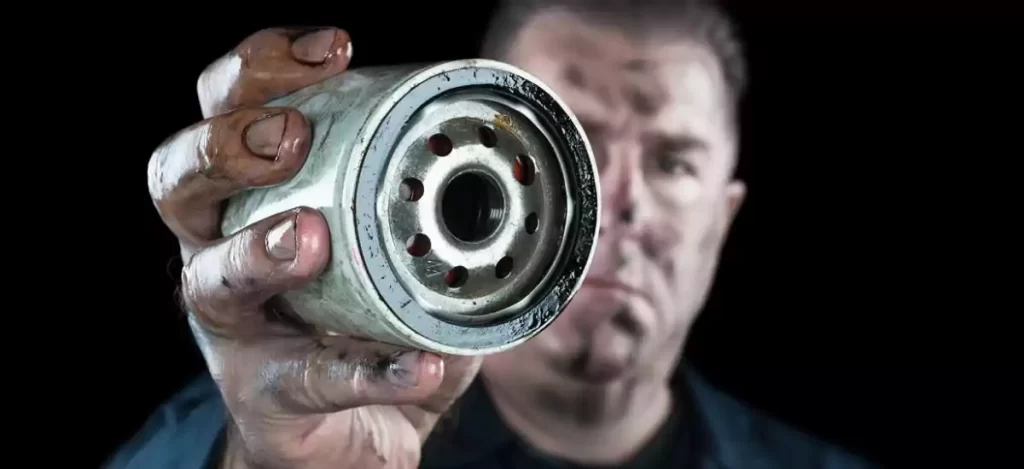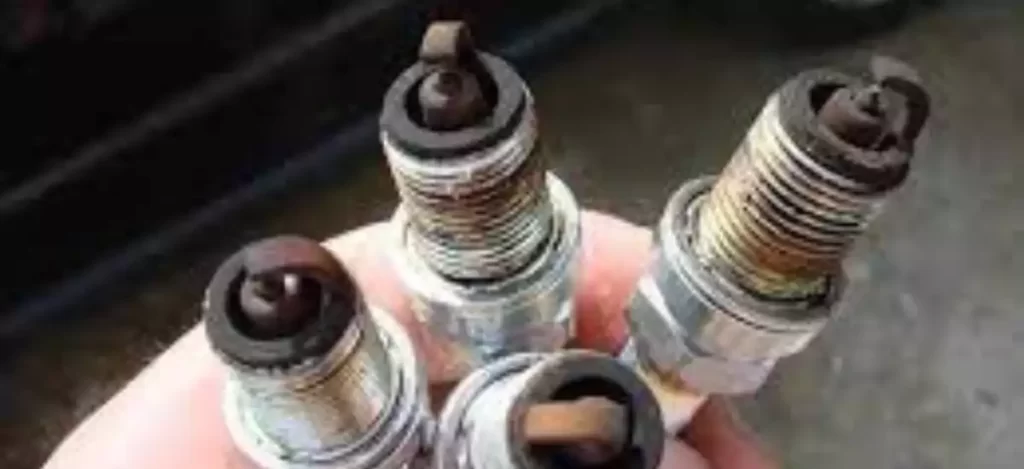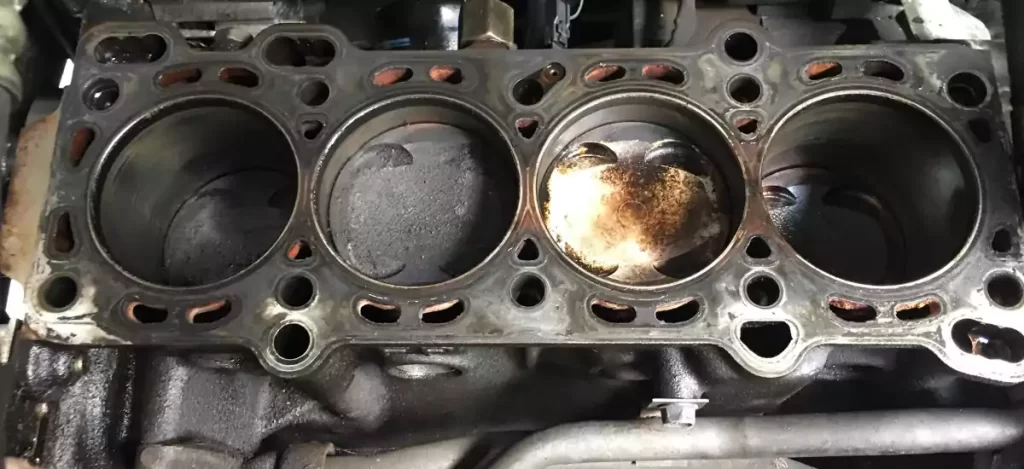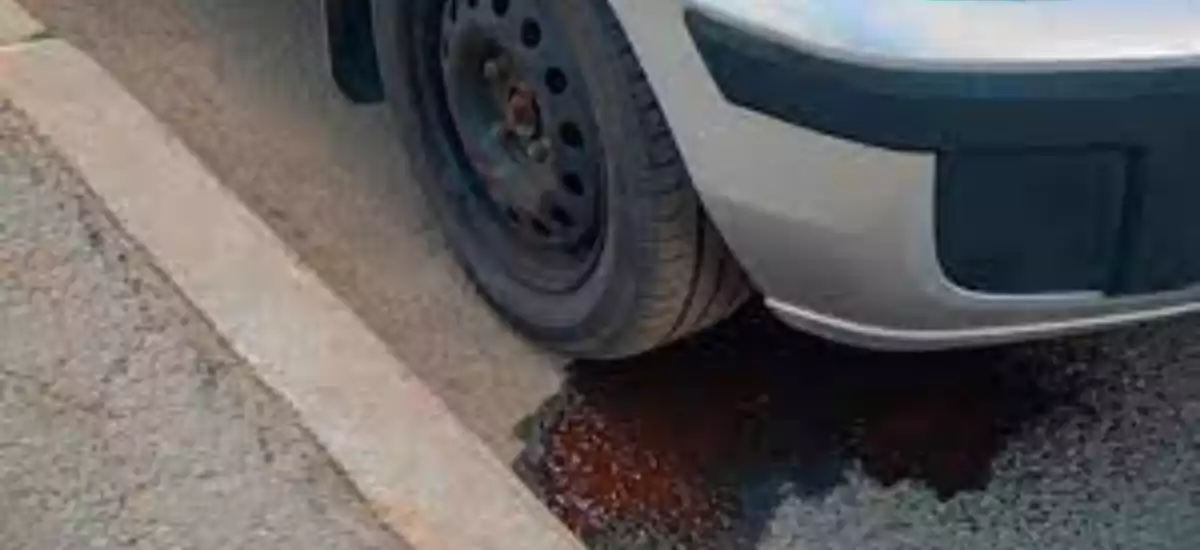It is essential to figure out what kind of liquid is leaking from your car. Many different types of fluids could have caused the puddle under your car. Each type of fluid leak points to another problem and has another solution.
If the fluid that has leaked from your car is red, it is likely transmission fluid that has been in the car for a long time. Red leaks can be caused by antifreeze, but most of the time, it’s transmission fluid. There may be a leak in the windshield wiper fluid if it’s blue.
Why Does My Parked Car Leak Oil?
Most of the time, it’s because the engine gaskets or oil seals have worn out. Sometimes these parts wear down over time, but if you have this kind of leak, it’s probably because your oil is old and dirty. This could be because you haven’t had your oil changed.
1- Damaged Oil Pan Or Damaged Oil Filter

If your oil filter is broken, oil can leak out as it goes through the filter and into your car’s engine. If the oil pan is broken instead of the oil filter, oil can pool under your vehicle when you’re done driving.
When your car goes over low spots on the road or roads with potholes, the oil pan can get dented if it gets hit hard enough to do some damage. When the car is parked, there may be a quick leak that worsens over time.
2- Bad Valve Seals Or Rings

Rings or valve seals that leak can also cause your car to lose oil. But if your gaskets don’t have any holes, the oil won’t get out of the engine because it will be burned up during the combustion process.
No matter what caused the oil leak, it needs to be fixed right away, so take your car to the Meineke shop. After the oil leak, you might smell burned oil, see blue smoke, and then find that your engine has been badly damaged. Don’t wait to deal with this problem.
3- Broken Seals Or Gasket

When you stop driving and park your car, the heat made while driving will still be in the engine block and the head; when the metal parts get hot, they get bigger, putting pressure on the seals and gaskets.
The seals and gaskets in the engine are meant to keep oil from leaking. But when the engine starts to cool down, the metal parts shrink, leaving spaces between the seals and the metal parts.
Because there won’t be enough pressure to stop an oil leak, if there are gaps, oil can leak out. Taking your car to an auto shop to see a mechanic can help you determine if the problem is a leaking seal, a lousy oil gasket, or a worn-out valve seal that lets oil leak through.
4-The Plug For The Oil Pan Is Not In The Right Place
If the threads on your oil pan plug are stripped or if it’s not in the right place or tightened all the way, it could be broken. A rubber plug can be used as a quick fix to replace the mechanism.
Over time, you will have to replace the whole thing with materials that will last. Most of the time, a permanent fix means replacing the plug with one that has a steel thread that is the right size for the shape of your car. If your car leaks oil when parked, this fix can help.
Also Read: 6 Common Causes of Car Clicks When Trying to Start
How To Tell If Your Car Is Leaking Oil
The oil keeps the engine running smoothly and is an integral part of your car. Oil stops rust, keeps the engine cool, and keeps moving parts too quickly.
If you see a black puddle under your car, it may be leaking oil. This is not something to ignore, and a mechanic should look at it as soon as possible.
Here are some things you should know about the most common signs of an oil leak and how dangerous it is to drive with one:
- If you don’t fix an oil leak, it can cause seals or rubber hoses to wear out faster than they should. Also, oil leaks can start fires and cause your car to break down without warning. If the oil catches fire or the engine breaks down while driving, you or other people could get hurt.
- One way to see if your car has an oil leak is to often look at the oil dipstick. If your oil level keeps going down, you likely have an oil leak.
- When you see that the oil level is low, add some oil and call a mechanic so they can figure out why the oil is leaking. Do not just add oil and forget about the leak. This could start a fire.
- The smell of burned oil is another sign of an oil leak. When oil leaks onto hot parts of the engine, you can smell it. If you sense something wrong coming from the front of your car, you should also call a mechanic.
- If you are driving down the road and see blue smoke coming out of your tailpipe, this is another sign that you may have an oil leak.
- Blue smoke usually means that oil is burning, indicating an oil leak. Also, look under the car to see any black puddles or stains. Together, these two signs show that there is an oil leak.
If your car has an oil leak, you could start a fire if you drive it. If the leak isn’t fixed quickly, the engine could wear out too rapidly and cause more significant problems.
How Often Should Oil Be Changed
Changing your oil regularly keeps your engine running well. When you change your oil, it’s a good idea to check on other parts of your car.
- Check the oil filter, which is essential for the quality of the oil and could cause leaks if it’s not in the right place.
- Make sure to check the oil pan, the filler cap, and the drain plug to ensure they are all in good shape and working correctly. You must follow the maintenance schedule written in your car’s manual or given to you by your mechanic.
- For most modern cars, the oil should be changed every 10,000 miles. But before you make any assumptions, make sure you have all the facts.
Related Post: What Does A Bad Spark Plug Look Like- Causes And Fixes
Add Things That Stop Leaks
Seals can be made less tight by using oil to soften them and stop tiny leaks. Even though this isn’t a long-term fix, it works well for a short time to stop small leaks.
Which Oil Is In Your Car?
Some of the newer oil brands have extra ingredients that stop or stop gaskets that are old and worn from leaking. Seal conditioners are the things added to the oil that keep the seal flexible and work well.
How Much Does Fixing a Leak Cost?
The cost of repairing an oil leak depends on the extent of the damage and how long you delayed starting the repair process. Oil repairs cost $150-$1,200.
This is an extensive range; therefore, you’ll need to see a technician for an estimate. The minor damage caused by the leak, the less you’ll pay.
If you have a broken filler cap or oil filter, fixing them will cost $100. Expect to pay $1,000 to repair a damaged oil pan.
Which gasket is degraded or broken determines its pricing. If the head gasket is blown, it might cost $2,000 to fix.
If your engine block is cracked, you must first figure out if it can be fixed. The average cost of repairing a broken engine block is $2,500 and $3,500.
After this, you also need to replace the engine. A regular motor costs between $4,000 and $5,000 to replace, while a performance engine can cost more than $10,000.
FAQs
1. How to fix an engine with water in the oil?
Please turn off the car’s engine and let it sit for a few hours. With a wrench, take out the drain plug from the oil pan. A small amount of oil will flow into a drain pan. Since oil is lighter than water, the water will sink to the bottom of the pan while the oil floats on top.
2. How much will it cost to fix an oil leak in the engine?
Depending on the type of car and where the oil leak is, fixing it could cost anywhere from $150 to $1200. You might be able to find another way to improve the leak in your engine.
3. If your car leaks oil, can you still drive it?
If your car has an oil leak, you should never drive it. However, short trips of less than 10 miles are not as likely to drop your oil level to a dangerous level.
4. Why is my car leaking oil but no leak?
If your PCV valve is broken, your car may lose oil but not leak or smoke because the oil can’t flow as it should.
Read More: Reasons Why Car Shuts Off When Stopped Or Slowing Down

